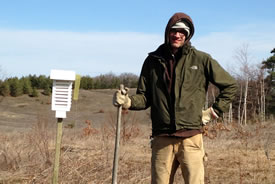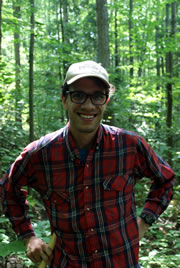Transferable confidence

Thomas Unrau at work (Photo by NCC)
In ecology we talk about how ecosystems with high biodiversity have a greater resilience compared to those that are more homogenous. I think that the same goes for a young professional starting his or her new career in conservation or the environmental sector.
Over the last few months of my internship with the Nature Conservancy of Canada (NCC), I’ve been struck by how I’ve been required to pull together a range of skills to get the most out of, and perform in, the position. I felt daunted in the beginning by the range of science, field work, office work, PR and labour I was presented with. In the position, I work alone day to day, receiving input and direction from a supervisor that has more on his plate than I care to even imagine. Juggling these diverse requirements to do the job was, to be honest, keeping me up at night.
You see, I’ve spent the meaningful part of my working life slogging in the bush as a backcountry ranger on the shores of the largest and most majestic lake in the world: Lake Superior. Whether hauling 60-pound packs of tools to work on trails, building 60-foot bridges over remote backcountry rivers or working with a chainsaw cutting brushy portages all day in the pouring rain, I’ve learned over my "career" (if you could call such fun work such a loaded word) to do one thing well: work hard in the bush.
I had no exposure to the office aspects of the provincial park’s operation, nor the overall conservation goals of its management. During my internship with the Nature Conservancy of Canada team responsible for protecting the Happy Valley Forest, I was asked to participate in tasks for which I had no previous foundation: whether helping organize a partners meeting, leading a guided hike or monitor the success of a management plans goals. Before starting my position with NCC, I wondered if I could learn what is necessary to be successful.
What I realized though is that my years of working hard in the backcountry have provided me with skills that are valuable here too. Hauling equipment on your back to the far end of a property to install a fence isn't the first thing that comes to mind when you think of a career in conservation, but when these jobs come up I’m proud to know that not every one could do them as well as I can.
They come easily to me now but it helps to remember that these things I am good at also had to be learned, that in order to be confident in these tasks I had to push myself through them too. Employment counselors would talk about these things as transferable skills. They would suggest you highlight these skills that aren’t directly related, but prepare you in essence for a new job. While that is one way to look at it, to me they’ve been most valuable as "transferable confidence."
Being able to swing a chainsaw around for cutting invasive trees, or staying focused on data collection when the mosquitoes pass the crazy point, gives me the confidence to face challenges in areas where I’m not so sure of myself. This confidence leaves me open to pushing myself to diversify my skills, which I’ll need for future work in the conservation world.
So whatever your transferable confidence is, let those skills give you the confidence to face new challenges and learn new things. Because as we start our careers, learning lots and diversifying our skills is going to help us get in a better position to work hard to protect our natural world.


